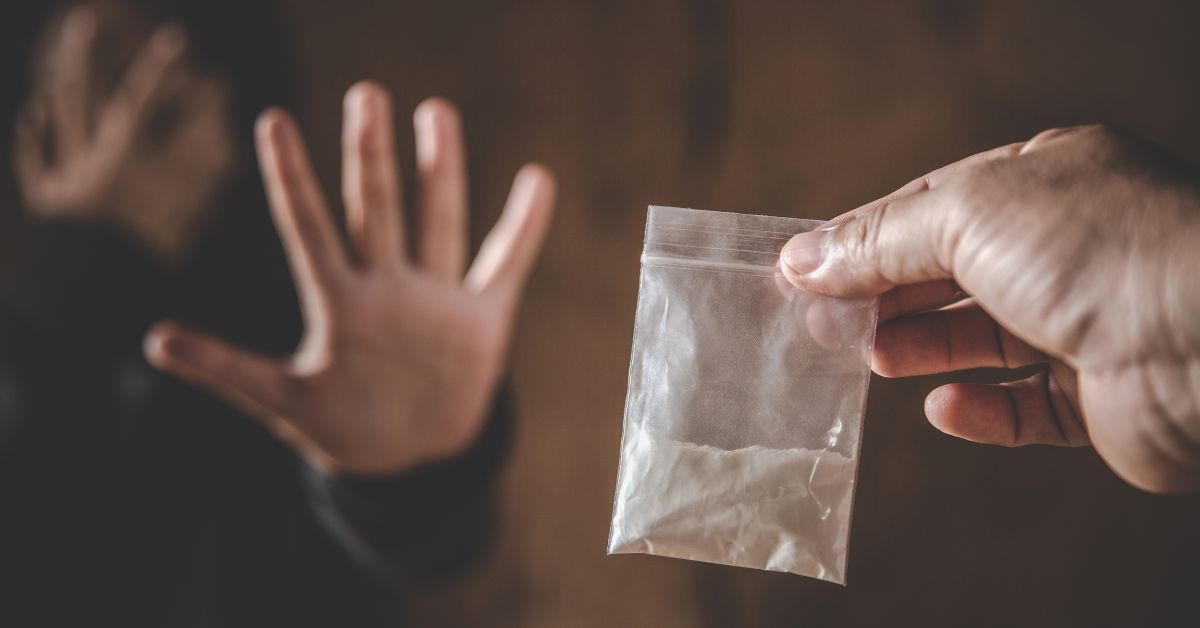Imagine the life of those you care for, completely free from the shackles of drug abuse, where the fog of substance abuse has lifted, allowing them to experience the world in vibrant, high-definition color.
Sounds like a dream, doesn’t it? But what if I told you that this dream could become your reality?
In this blog post, we’re going to explore the practical, actionable steps you can take to help those close to you break free from the relentless grip of drug dependence.
No more sleepless nights, no more broken promises, or feeling trapped in a never-ending cycle. Let’s dive in.
Understanding Drug Addiction

Defining Addiction
Let’s start by addressing the million-dollar question: What is drug addiction?
To make it easy to understand, it is a chronic, relapsing brain disease that results in compulsive drug-seeking and use, despite its harmful consequences. In reality, it’s not about a lack of willpower or moral failure but rather a complex interplay of genetics, environment, and personal experiences.
You might be wondering, “Which drugs are commonly abused?” The list is pretty big, but some of the most frequently abused substances we’ve included in the table below:
| Drug Category | Examples | Effects on the Body |
|---|---|---|
| Opioids | Heroin, Oxycodone, Fentanyl | Pain relief, drowsiness, euphoria |
| Stimulants | Cocaine, Methamphetamine, Adderall | Increased energy, alertness, euphoria |
| Depressants | Alcohol, Benzodiazepines, Barbiturates | Reduced anxiety, sedation, relaxation |
| Hallucinogens | LSD, Psilocybin, MDMA | Altered perceptions, hallucinations, euphoria |
FREE: Get the 3 pieces of advice that helped me understand this disease of addiction
Causes of Drug Addiction
We all know that it can wreak havoc on a person’s life, but why do people become addicted? There is no single answer to this question, as multiple factors contribute to it. Some of the most significant causes are:
- Genetic predisposition
- Exposure at an early age
- Lack of healthy coping mechanisms
- Trauma or adverse childhood experiences
- Social and environmental influences
Effects of Drug Addiction
Substance abuse can have far-reaching consequences on an individual’s life. Some of the most devastating effects include:
- Physical health issues, such as organ damage, weakened immune system, and overdose
- Mental health problems, including depression, anxiety, and cognitive decline
- Strained relationships
- Financial and legal troubles
- Social isolation and stigmatization
The Importance of Helping

Physical and Mental Health Benefits
Now that we have a better understanding of drug addiction let’s discuss why it’s crucial to help those struggling with addiction. For starters, this has immense physical and mental health benefits. It can lead to a reduction in use, a decreased risk of overdose, and an improvement in the overall health and well-being of the addict.
Helping those we care about with treatment and recovery can help people develop healthy coping mechanisms, confront underlying mental health issues, and opportunity to learn essential life skills to maintain prolonged wellness.
Improved Relationships
Another benefit is the potential for improved relationships. As you probably know, addiction can strain even the strongest of bonds, leaving close family and relatives, which may include you, hurt, confused, and frustrated. By embracing and helping addicts with their recovery, they can begin to rebuild trust, mend broken relationships, and foster an environment in which open communication and mutual support can thrive.
Greater Life Satisfaction
Last but not least, this can also lead to greater life satisfaction. Imagine waking up each day, seeing the people you care about, free from the suffocating grip of substance use disorders, and excited about the opportunities that lie ahead. This sense of contentment and purpose is priceless and can be achieved by lending a helping hand to their first step toward recovery.
UPDATED: Discover the 3 life-changing things about addiction I wish I knew years ago
Recognizing the Problem

Signs of drug addiction
Behavioral changes
Have you ever noticed your loved one behaving differently, and you can’t quite put your finger on what has changed?
Behavioral changes are often the initial signs. They may suddenly lose interest in activities they once enjoyed, become secretive and isolated, or develop new friendships with individuals who may enable their drug use. Watch out for sudden mood swings, a decline in personal hygiene, and a lack of motivation in daily life.
Physical symptoms
Did you know that physical symptoms can manifest when someone is addicted to drugs?
Depending on the substance, these symptoms may include weight loss or gain, dilated or pinpoint pupils, bloodshot eyes, frequent nosebleeds, tremors, and changes in skin complexion. Keep in mind that different drugs produce different physical signs, so it’s essential to stay informed and observant.
Emotional and psychological symptoms
Addiction doesn’t just affect the body; it also takes a toll on a person’s emotional and psychological well-being.
Pay attention to any changes in the emotional state of the people close to you, such as unexplained anxiety, depression, irritability, or even sudden bursts of euphoria. They may also have difficulty concentrating or making decisions, leading to a decline in their overall mental functioning.
Self-assessment
Identifying triggers
If you suspect that your relative or companion has substance abuse, it’s crucial to help them identify their triggers. What situations, emotions, or people may prompt them to use drugs? Common ones include stress, social pressure, boredom, loneliness, or unresolved trauma. Becoming aware of these can be a significant primary step in the journey toward the healing process.
Recognizing patterns
Can you see any patterns in your loved one’s substance use? Have they been using them more frequently or in larger quantities over time without regard for the prescription? These patterns can shed light on the severity of their addiction and help them take appropriate action to overcome it.
GET: The 3 things that actually "allowed" me to help my son (and regain control again)
Determining the severity of addiction
So, how can you determine the severity? The answer is not always straightforward, but there are some telltale signs to watch out for:
- Increasing drug tolerance: They need more of the substance to achieve the same effects.
- Withdrawal symptoms: They experience physical or emotional discomfort when they stay away from the drug.
- Loss of control: They can’t avoid using the drug, despite the negative consequences it may have on their life.
Remember, addiction doesn’t discriminate – it can happen to anyone. As a loved one, friend, or family member, you have the power to make a difference in someone’s life. Recognizing the problem is the first step towards helping them find the treatment and support they need to overcome and reclaim their lives.
Seeking Professional Help and Treatment Options

Finding a healthcare professional
It’s important to know that you’re not alone in this journey, and while looking out for professional help is important, most don’t know where to start…so where do you begin?
- Primary care physicians are often the first point of contact. They can assess the situation, provide referrals, and may even prescribe medications to manage withdrawal symptoms. Plus, they’re already familiar with your loved one’s medical history, which can be invaluable in determining the best course of treatment.
- Psychiatrists are another option, particularly for those grappling with co-occurring mental health disorders. These medical professionals specialize in mental health and can provide a comprehensive treatment program that handles both the addiction and any underlying mental health issues.
- Addiction specialists are the navigators who chart the course through recovery. They have extensive knowledge and experience in medicine and can provide tailored treatment plans to suit the individual’s unique needs.
Treatment Options
Once you’ve found the right healthcare professional, it’s time to explore treatment options. Let’s take a closer look at some options:
| Treatment Type | Pros | Cons |
|---|---|---|
| Inpatient Rehab | A structured environment, 24/7 support | Disruption of daily life, cost |
| Outpatient Treatment | Flexible scheduling, lower cost | Less intensive support |
| Medication-assisted Treatment | Reduces cravings, withdrawal symptoms | Requires medical supervision, may not work for everyone |
| Therapy | Addresses underlying issues, customized approach | Requires commitment, finding the right therapist |
| Support Groups | Peer support, accountability | May not confront all needs, finding the right group |
Creating a Support System to Help Others

Building a Support Network
One key component is to create strong pillars of support around the people you care about. A solid support system is essential. This support can come in many forms:
- Family and Friends: They say it takes a village to raise a child, but the same can be said about supporting someone through their healing process. Your presence, understanding, and encouragement can make a world of difference. Remember, you’re not alone in this journey; lean on each other for strength and support.
- Support Groups (e.g., Narcotics Anonymous): There’s something powerful about being surrounded by people who have walked the same path and faced similar challenges. Groups like Narcotics Anonymous provide a safe space for your loved one to share their story, learn from others, and receive guidance from those who have successfully navigated the road to recovery.
- Online Forums and Communities: In today’s digital age, a wealth of resources is just a click away. Online forums and communities can provide a sense of camaraderie, understanding, and unconditional support, especially when physical meetings may not be possible or practical.
FREE: Get the 3 pieces of advice that helped me understand this disease of addiction
Communicating With Loved Ones
Sharing your struggles
Honest communication is essential when supporting someone. Don’t be afraid to share your own struggles and vulnerabilities. It’s a sign of strength, not weakness, to admit that we’re all human and face challenges. By opening up, you create a dialogue that allows your loved one to feel safe sharing their thoughts, fears, and emotions.
Establishing boundaries
Just as crucial as open communication is setting boundaries. It’s essential to strike a balance between supporting your loved one and maintaining your own emotional health. Establishing boundaries can be as simple as limiting the time you spend discussing addiction-related topics or as complex as creating specific guidelines regarding your involvement in their recovery process. Whatever your boundaries, be sure to communicate them clearly and consistently.
Expressing gratitude
Don’t underestimate the power of gratitude. We often focus on the challenges and setbacks, but it’s important to recognize and celebrate the small victories along the way. Express your appreciation for your loved one’s efforts, their courage in facing their addiction, and the progress they’ve made. A heartfelt “thank you” can be a potent motivator and a reminder that their journey is worth it.
Developing Healthy Coping Strategies

Managing triggers
Identifying high-risk situations
Imagine for a moment that you are walking down the street, and you suddenly catch a whiff of your favorite comfort food. Your mouth starts watering, and your mind wanders to the memories of when you used to indulge in that dish. Now picture that same scenario, but instead of food, it’s a trigger for addiction. Helping those you care about recognize these high-risk situations is the foundation for managing triggers.
Create action plans
Once they have identified the triggers that can lead to a recurrence, create a plan of action for each. For instance, if you know that social events with friends who still indulge in addictive behaviors are a trigger, prepare a list of alternative activities or come up with an exit strategy. The key is to help your loved ones have a plan in place that enables you to cope with those triggers in a healthy way.
Practice assertiveness
“No” can be one of the most powerful words in their vocabulary. Teach the people close to you that it’s okay to say no to situations that may put you at risk for relapse. Being assertive means standing up for themselves and their transformational journey. It’s not about being aggressive; it’s about setting boundaries and communicating their needs clearly.
UPDATED: Discover the 3 life-changing things about addiction I wish I knew years ago
Establishing a daily routine
Incorporating exercise
How often have you heard someone say that exercise is their “drug of choice”? There’s a reason for that. Exercise releases endorphins, which can help improve mood and relieve stress. Make a conscious effort to incorporate physical activity into the daily routine of the people you care about, whether it’s a brisk walk around the block or a more vigorous workout. The benefits of exercise extend beyond just physical health – it can also be a powerful tool in sustaining recovery.
Prioritizing sleep
We all know how cranky we can get after a poor night’s sleep, right? Now imagine anyone dealing with the challenges of quitting drugs on top of that. Sleep is essential for maintaining both physical and mental health, so help those close to you get enough rest each night. Establish a sleep schedule with them and create a calming bedtime routine that signals to their body when it’s time to wind down.
Eating a balanced diet
Let’s face it: when we’re stressed or overwhelmed, it’s all too easy to reach for the nearest bag of chips rather than a nutritious meal. But a well-balanced diet can have a significant impact on the overall well-being and recovery process of the people you care for. To help with this, aim to include a variety of fruits, vegetables, lean proteins, and whole grains in their daily meals. This will not only keep their body healthy but also help refine their mood and energy levels.
Managing stress
Mindfulness and meditation
If you have heard about the benefits of mindfulness and meditation in reducing stress, then you must try to incorporate them into your daily routine. Practicing mindfulness means being fully present in the moment, without judgment is an invaluable skill in managing stress and staying focused on getting better. Set aside time each day to practice mindful meditation with your loved ones each day, even if it’s just for a few minutes. You all be amazed at the difference it can make in their overall wellness.
Breathing exercises
Take a deep breath.
No, really – do it right now.
Notice how it instantly calms you down?
That’s the power of deep breathing. Teach those close to you to take a moment to focus on their breath when feeling stressed or overwhelmed. Inhaling for a count of four, holding for four, and exhaling for four. Oftentimes, they may repeat the process until they’re more relaxed and in control.
Progressive muscle relaxation
This technique involves tensing and relaxing different muscle groups in the body to release tension and reduce stress. They may start by tensing a muscle group (such as your feet) for a few seconds and then slowly release the tension as they exhale. It’s important that they work their way up their body, focusing on one muscle group at a time. With practice, they will become more aware of the tension in their body and better equipped to release it.
Maintaining Sobriety

Embracing change
Setting short-term and long-term goals
Remember when you were a kid, and you’d dream about your future? You’d imagine the kind of life you’d lead, the places you’d go, and the person you’d become. As we grow older, those dreams often become buried under the weight of life’s challenges, especially in the face of addiction.
But guess what? It’s never too late to dream again, and your loved ones must know this. In fact, setting goals is a crucial part of sustaining sobriety. It brings a sense of purpose, direction, and something to work towards. So, dust off those old dreams or create new ones with them, and start setting achievable milestones that will help them stay on track.
GET: The 3 things that actually "allowed" me to help my son (and regain control again)
Celebrating milestones
How do you eat an elephant?
One bite at a time, right?
The same goes for achieving the goals and milestones you set for those you care about.
It’s really important to break them down into smaller, manageable steps and celebrate each milestone. Whether it’s staying sober for 30 days or completing a course that aids their urge to use substances, take the time to acknowledge their achievements and reward them – they absolutely deserve it!
Adapting to challenges
You know what they say, “Change is the only constant.” And it’s true. Life is full of unexpected twists and turns, and preserving abstention requires the ability to adapt to those challenges. Embrace the ebb and flow of life, and remember, they are not alone in this journey. If it gets tough, reach out to their support network to help them stay committed to their goals.
- Setting short-term and long-term goals
- Celebrating milestones
- Adapting to challenges
Preventing relapse
Recognizing warning signs
Ever heard of the proverb, “A stitch in time saves nine”? It’s a reminder that addressing a problem early on can save you from bigger issues down the road. The same applies to preventing relapse for those we care about. Learn to recognize the warning signs – such as isolating, neglecting their self-care, or romanticizing past substance use – and take action before it’s too late.
Seeking help when needed
There’s a reason why superheroes have sidekicks – because even the strongest among us need help sometimes. Encourage people close to you dealing with to never be afraid to reach out to their support network when feel vulnerable or struggle with cravings. Asking for help is a sign of strength, not weakness.
Strengthening support networks
Think of your support as the safety net that catches them when they stumble. The stronger it is, the more resilient it’ll be in the face of challenges. Nurture relationships with people who also support their abstinence and encourage them to attend recovery meetings regularly. Surrounding them with positive influences will better equip them to prevent a recurrence.
Continuing personal growth
Engaging in hobbies and interests
Did you know that engaging in hobbies and interests can help maintain sobriety? It’s true! Pursuing activities that bring joy, relaxation, or a sense of accomplishment can act as a healthy outlet for stress and keep the mind focused on positive pursuits. So, whether it’s painting, hiking, or playing the guitar, make time for the activities that feed your soul with the people you care for.
Pursuing education and career opportunities
Addiction can derail the education and career goals of your loved ones, but it’s never too late for them to get back on track. Encourage personal growth in these areas to help them build a stable and fulfilling life. They can also research educational programs, seek career counseling, or attend workshops that enhance their skills and boost the quality of their lives – the sky’s the limit!
Fostering healthy relationships
Healthy relationships are the cornerstone of a fulfilling life, and they play a significant role in remaining sober. Thus, while you invest time and effort in building connections with them, understand their journey, and support their goals, you must encourage them to be there for others and offer them support.
The lifelong journey of addiction recovery
Addiction recovery is a lifelong journey, a ceaseless endeavor of personal growth, and a steadfast commitment to recovery and support networks.
But this is only the tip of the iceberg.
Anyone stepping off the well-trodden path delves into the mysteries of resilience and the human spirit. How far does this journey truly go? What unexpected discoveries lie ahead?
Only by embracing the journey and being available to help can you begin to uncover these profound answers. The adventure of rehabilitation, it seems, is only just beginning.
FREE: Get the 3 pieces of advice that helped me understand this disease of addiction
